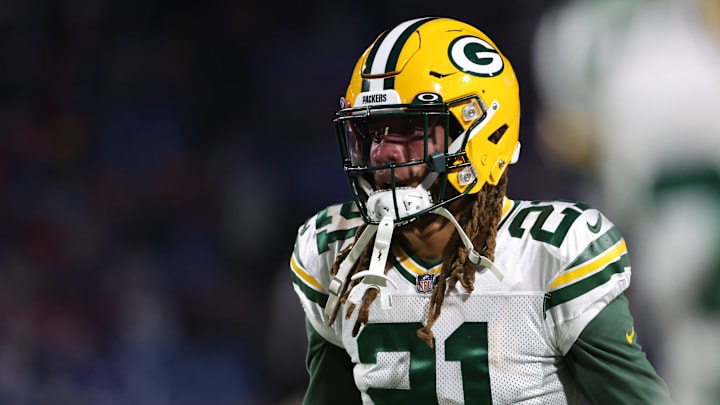The Green Bay Packers' optimism in their cornerback room hasn't matched that of the fanbase in recent months. It was surprising when the Packers waited until the seventh round of the 2024 NFL Draft to address the position.
Packers fans point to the recent injury concerns of Eric Stokes and Jaire Alexander, who have missed a combined 47 games over the past three seasons. Carrington Valentine played well as a rookie, but he was a seventh-round pick and isn't guaranteed to remain a reliable starter on the outside.
The Packers don't have many starting options at cornerback beyond those three.
Green Bay maintained its confidence in its cornerback room by passing on several opportunities to add talent in the early rounds of the NFL Draft, which suggested optimism about Stokes' return from injury.
Despite their confidence, the Packers declined Stokes' fifth-year option, meaning he will become a free agent in 2025. It makes their draft decision look even stranger.
Packers declining Eric Stokes' fifth-year option makes draft decision even worse
The Packers' decision to turn down the option shows they aren't fully convinced that Stokes can be a long-term starter. He has featured in only 12 games over the past two seasons and hasn't played well when healthy. According to Pro Football Reference, Stokes has allowed 26 of 33 passes in his coverage to be completed for 340 yards and four touchdowns with a passer rating of 149.2 since the start of 2022.
Declining the fifth-year option is understandable. It was the right decision. Stokes has to prove himself, and Green Bay smartly didn't want to add on a one-year, fully guaranteed $12.47 million extension to his rookie deal.
But that proves the point.
If the Packers aren't willing to make that commitment, it shows they have concerns. And if there are concerns, why not add more depth at outside corner early in the draft?
Green Bay had several golden opportunities.
Toldeo's Quinyon Mitchell, Alabama's Terrion Arnold, and Iowa's Cooper DeJean were available at No. 22 in the first round, three picks before the Packers hit the clock. They ended up with none of them.
Mitchell was the perfect Packers prospect and never should've fallen so far. Green Bay could've traded ahead of the Philadelphia Eagles for a reasonable price to land a future Pro Bowler who checks every box they look for in terms of athleticism, size, production, and potential.
The Lions seemingly also believed the Packers would want a top-tier corner, trading above them to land Arnold.
On the clock in the first round, the Packers passed on DeJean and Alabama's Kool-Aid McKinstry. DeJean even fell to No. 40, one pick before Green Bay's in Round 2, where the Eagles traded ahead of the Packers to select him. Green Bay then traded down, allowing the New Orleans Saints to move up for McKinstry.
The Packers turned down Elijah Jones, who comes from Jeff Hafley's Boston College defense. T.J. Tampa also made a lot of sense.
They had opportunities but didn't feel the need to improve their cornerback room. But their decision to decline Stokes' fifth-year option proves they have some of the same concerns as the rest of us.
If Stokes and Alexander can't play the full season, Green Bay will have to rely on Valentine and special-teamer Corey Ballentine to play the majority of snaps on the outside.
The Packers are rolling the dice at a premium position.
